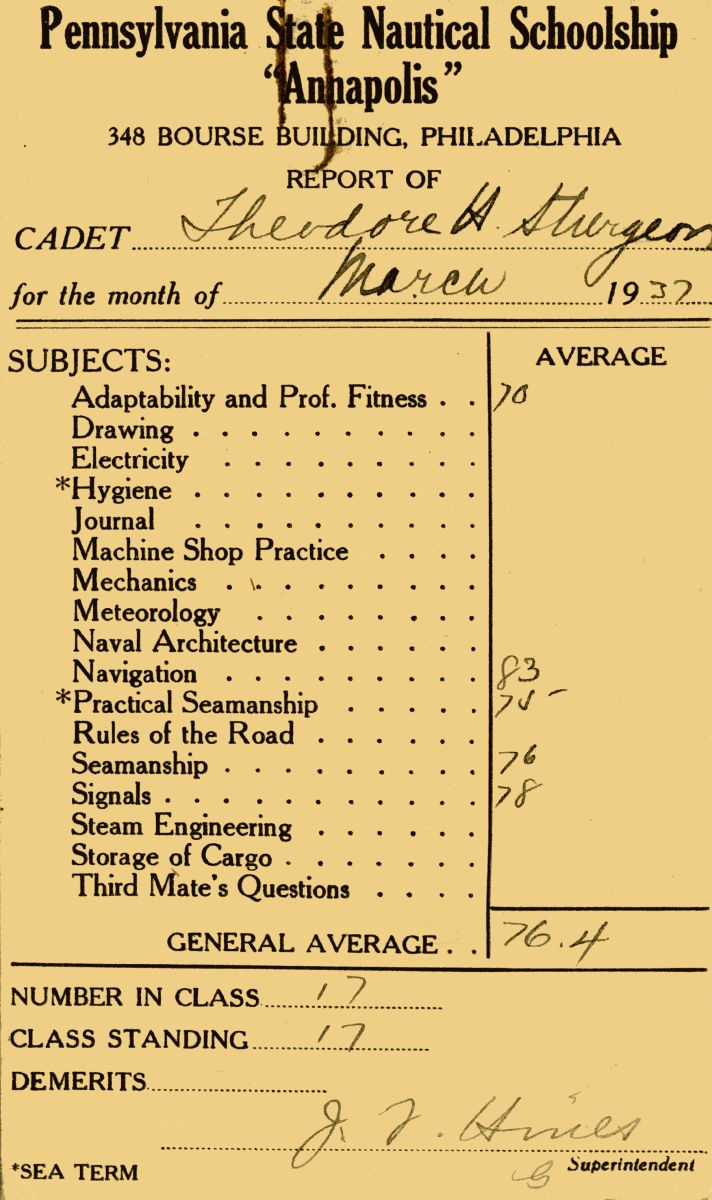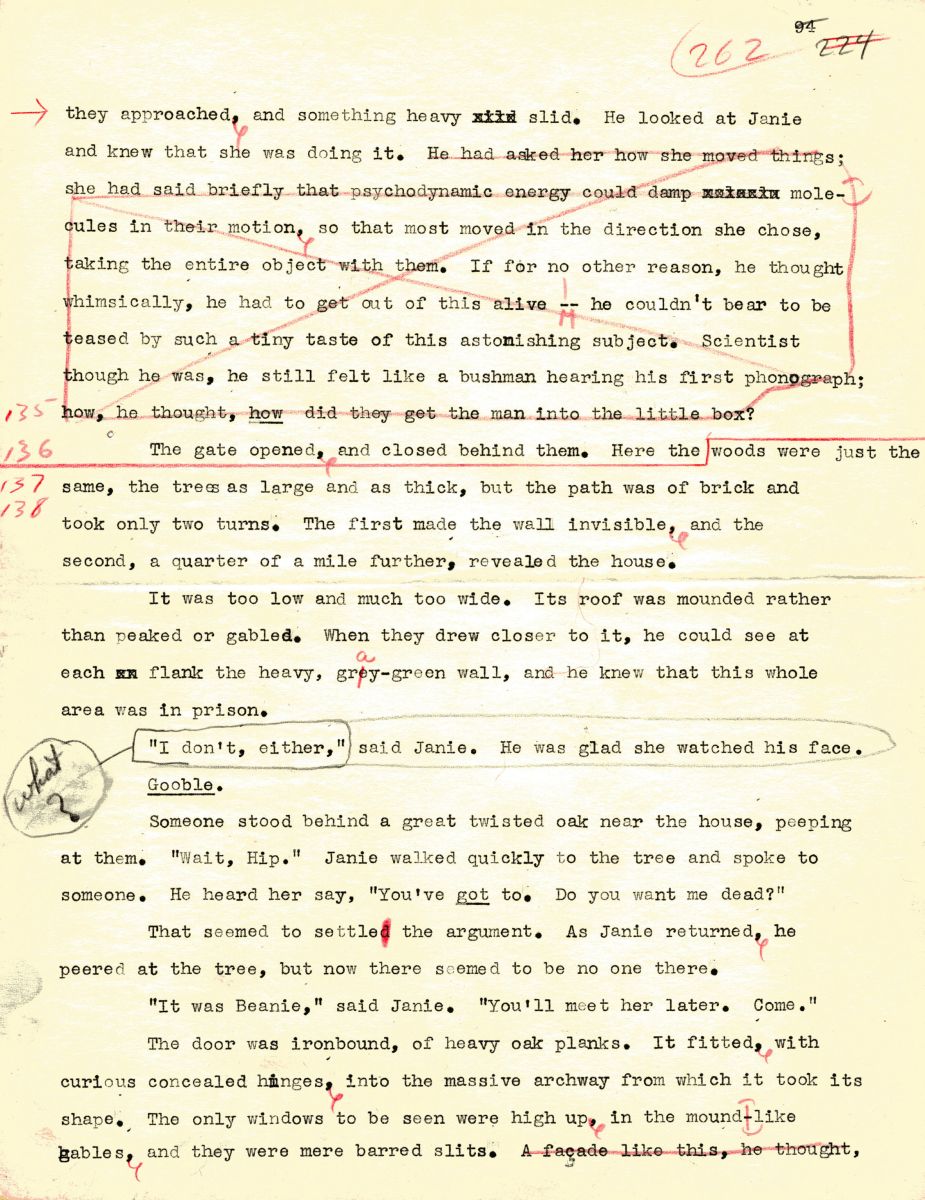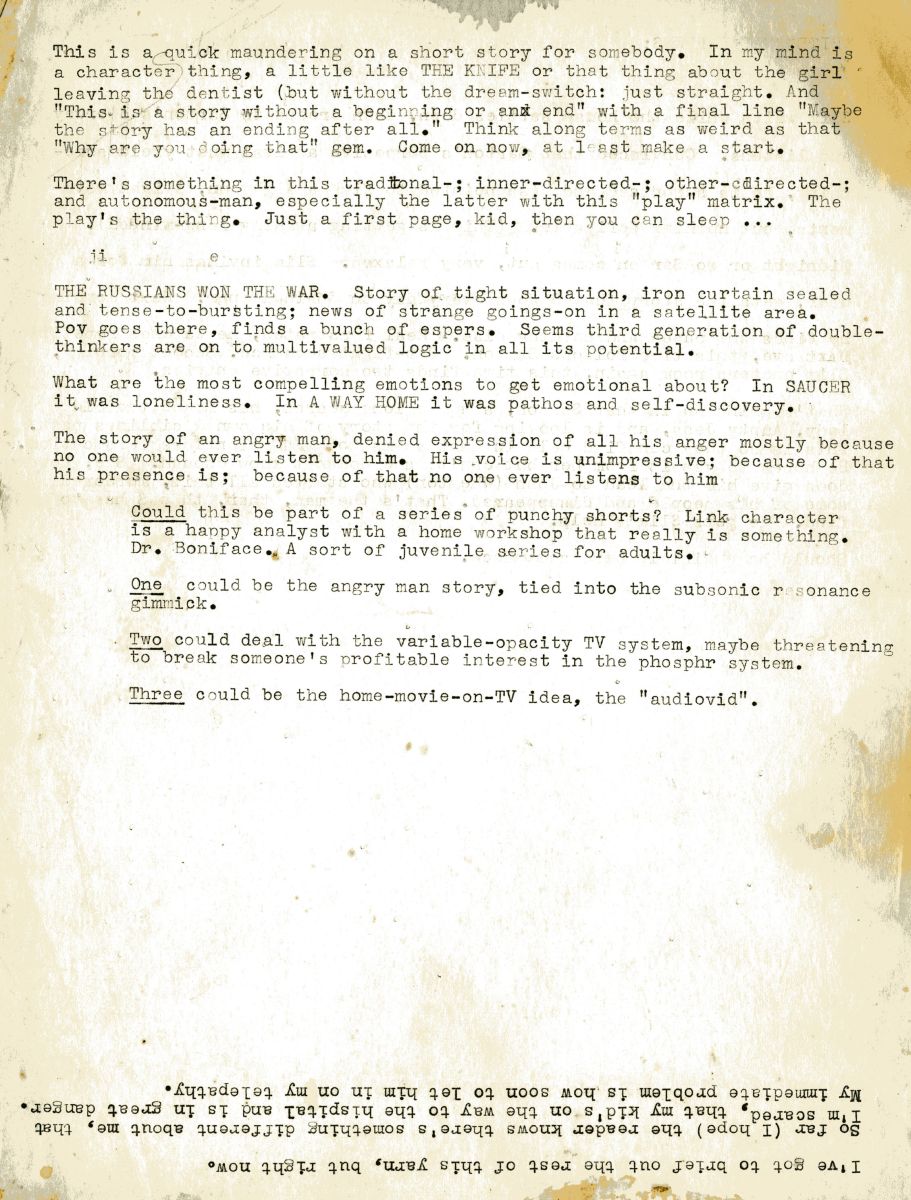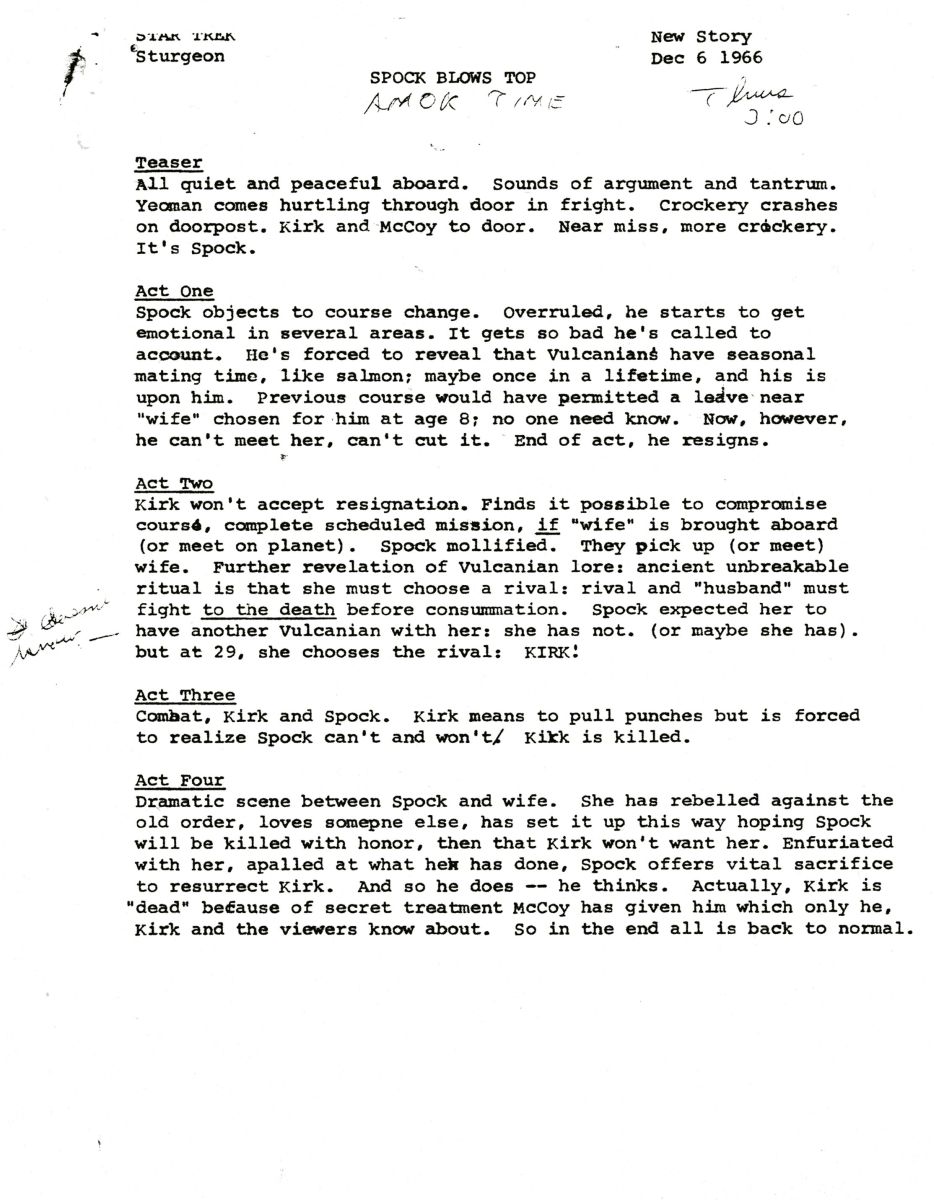Dreaming Jewels (21 page)
Authors: Theodore Sturgeon
He sensed someone at the door. He took out his handkerchief and wiped his eyes. They still burned. He turned out the desk lamp and went to the door. Solum.
Horty went out, closed the door behind him, and sat down on the mounting step.
As bad as that?
“I guess it is,” said Horty. “I—didn’t really think she was going to stay dead until just now.” He waited a moment, then said harshly, “Make conversation, Solum.”
We lost about a third of our strange people. Every one of them within two hundred feet of that blast of yours.
“May they rest in peace.” He looked up at the looming green man. “I meant that, Solum. It wasn’t just a line.”
I know.
A silence. “I haven’t felt like this since I was kicked out of school for eating ants.”
What did you do that for?
“Ask my crystals. While they operate they cause a hell of a formic acid deficiency. I don’t know why. I couldn’t keep away from ’em.” He sniffed. “I can smell ’em now.” He bent, sniffed again. “Got a light?”
Solum handed him a lighter, flaming. “Thought so,” said Horty. “Stepped smack on an anthill.” He took up a pinch of the hill and sifted it on his palm. “Black ants. The little brown ones are much better.” Slowly, almost reluctantly, he turned his hand over and dropped the rubble. He dusted his hands.
Come on over to the mess tent, Horty.
“Yeah.” He rose. On his face was a dawning perplexity. “No, Solum. You go ahead. I got something to do.”
Solum shook his head sadly and strode off. Horty went back into the trailer, felt his way to the back wall where the Maneater had kept his laboratory racks. “Ought to have some here,” he muttered, switching on the light. Muriatic, sulphuric, nitric, acetic—ah, here we go.” He took down the bottle of formic acid and opened it. He found a swab, wet it in the acid and touched it to his tongue. “That goes good,” he muttered. “Now, what is this? A relapse?” He lifted the swab again.
“That smells
so
good! What is it? Could I have some?”
Horty bit his tongue violently, and whirled.
She came into the light, yawning. “Of all the crazy places for me to go to sleep… Horty! What’s the matter? You’re—are you crying?” Zena asked.
“Me? Never,” he said. He took her into his arms and sobbed. She cradled his head and sniffed at the acid.
After a time, when he had quieted, and when she had a swab of her own, she asked, “What is it, Horty?”
“I have a lot to tell you,” he said softly. “Mostly it’s about a little girl who was an undesirable alien until she saved a country. Then there was a sort of international citizen’s committee that saw to it that she got her first papers, and her husband as well. It’s quite a story. Real artistic…”
P
ART OF A LETTER
:
…in the hospital just resting up, Bobby Baby. I guess I just cracked under the strain. I don’t remember a thing. They tell me I walked out of the store one evening and was found wandering four days later. Nothing had happened to me, really nothing, Bob. It’s a weird thing to look back on—a hole in your life. But I’m none the worse for wear.
But here’s some good news. Old Crawly-Fingers Bluett died of a heart attack at the carnival.
My job at Hartford’s is waiting for me whenever I get back. And listen—remember the wild tale about the young guitarist that lent me $300 that awful night? He sent a note around to Hartford’s for me. It said he had just inherited a business worth two million and I was to keep the money. I just don’t know what to do. No one knows where he is or anything about him. He’s left town permanently. One of the neighbors told me he had two little daughters. Anyway he had two little girls with him when he left. So the money’s in the bank and Daddy’s legacy in the bag.
So don’t worry. Specially about me. As for those four days, they didn’t leave a mark on me; well, a little bruise on one cheek, but that’s nothing. They were probably good days. Sometimes when I’m waking up, I have a feeling—I can almost put my finger on it—it’s sort of a half memory about loving somebody who was very, very good. But maybe I made that up. Now you’re laughing at me…
Theodore Hamilton Sturgeon (1918–1985) is the acclaimed author of eleven novels and more than two hundred short stories. Considered to be among the most influential writers of science fiction’s “Golden Age,” he won the International Fantasy Award for his novel
More Than Human
, and the Hugo and Nebula Awards for his short story “Slow Sculpture.”
Born Edward Hamilton Waldo in Staten Island, New York, Sturgeon was the son of Edward Molineaux Waldo, a paint and dye manufacturer, and Christine Hamilton Waldo, a teacher. At the age of eleven, following his mother’s remarriage, his name was legally changed to Theodore Sturgeon.
Sturgeon began writing stories and poems during the three years he spent working as an engine room laborer on a freighter. Beginning in 1938, he published short stories for genre and general market publications including
Astounding
(now
Analog Science Fiction and Fact
),
Unknown Worlds of Science Fiction
, and
Argosy
. His groundbreaking short story “The World Well Lost” (1953), which was among the first science fiction stories to include positive themes of homosexuality, went on to win the Gaylactic Spectrum Award in 2000.
Sturgeon’s 1953 novel
More Than Human
was considered groundbreaking for science fiction in its stylistic daring, fine characterization, and visionary impact. Offering the idea that the next step in human evolution was a gestalt organism composed of people with different and strange talents who “bleshed,”
More Than Human
was an inspiration to many in the 1960s counterculture, including artists and musicians such as the Grateful Dead and Crosby, Stills and Nash.
In the 1960s, Sturgeon ventured into television writing, penning the screenplays for two of the most popular
Star Trek
episodes: “Shore Leave” (1966) and “Amok Time” (1967). He is credited with inventing the story of Spock’s sex life, as well as the famous Vulcan greeting, “Live long and prosper,” and (with Leonard Nimoy) its accompanying hand signal. Two of Sturgeon’s stories were adapted for
The New Twilight Zone
, and his novella
Killdozer!
(1944) became a television movie in 1974. He is also the creator of Sturgeon’s Law—90 percent of everything is crap—which he developed to counter the common denigration of science fiction as a genre.
Beloved by critics and readers alike, Sturgeon inspired a generation of authors across genres, such as Samuel R. Delany, Michael Chabon, Jonathan Lethem, Octavia E. Butler, Karen Joy Fowler, and Rad Bradbury. Kurt Vonnegut considered Sturgeon to be one of the best writers in America, and Sturgeon served as inspiration for Vonnegut’s recurring character, Kilgore Trout.
Survived by his seven children, Sturgeon died in Eugene, Oregon, on May 8, 1985. In 2000, he was posthumously inducted into the Science Fiction Hall of Fame.

The decree wherein Sturgeon is officially adopted by his stepfather (William “Argyll” D. Sturgeon) and his mother, and his last name is changed accordingly, from “Waldo” to “Sturgeon.” (Photo courtesy of Special Collections, Kenneth Spencer Research Library, University of Kansas.)

Sturgeon’s report card from the Pennsylvania State Nautical Schoolship “Annapolis” postmarked April 10, 1937, showing his rank as last in his class of cadets. (Photo courtesy of Special Collections, Kenneth Spencer Research Library, University of Kansas.)

Sturgeon with his third wife, Marion McGahan, and (left to right) daughter Tandy (b. 1954), son Robin (b. 1952), and daughter Noël (b. 1956).

A typescript page from
More Than Human
with handwritten edits. (Photo courtesy of Special Collections, Kenneth Spencer Research Library, University of Kansas.)

A page from Sturgeon’s “inspiration file.” (Photo courtesy of Special Collections, Kenneth Spencer Research Library, University of Kansas.)

Notes, dated 6/12/66 and entitled “Spock Blows Top,” for an episode of
Star Trek
that Sturgeon wrote, ultimately titled “Amok Time.” (Photo courtesy of Special Collections, Kenneth Spencer Research Library, University of Kansas.)